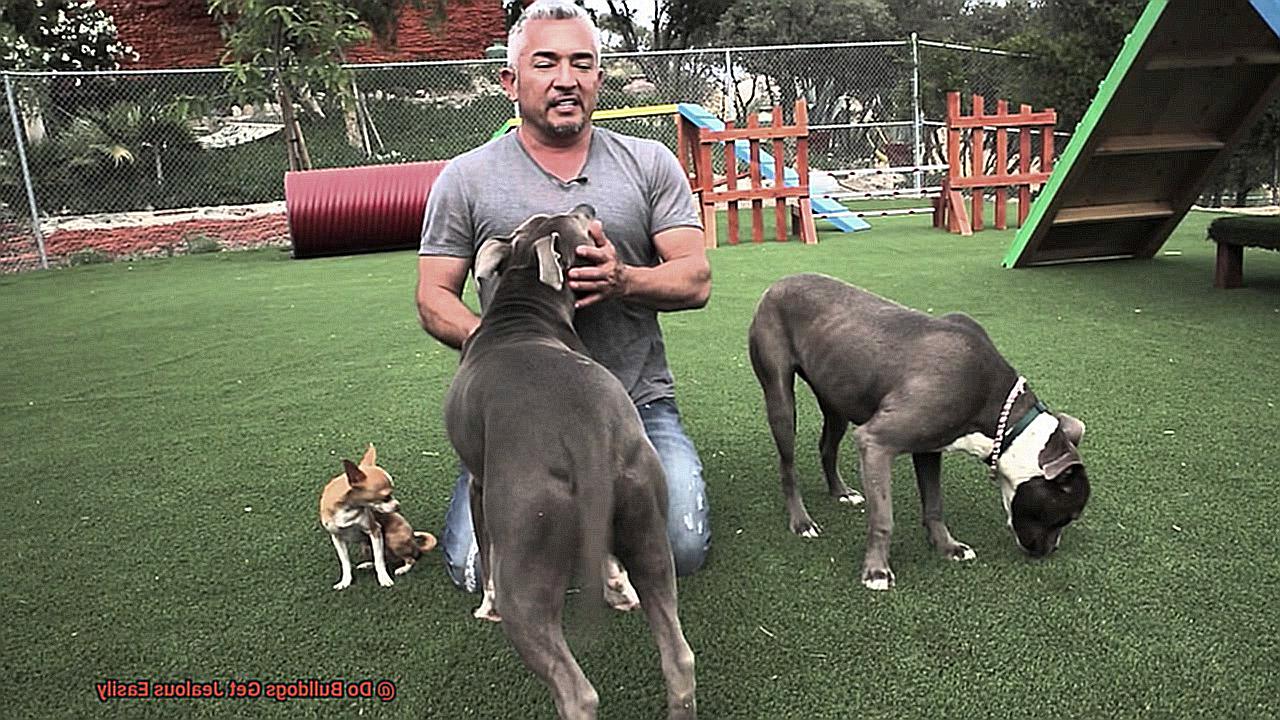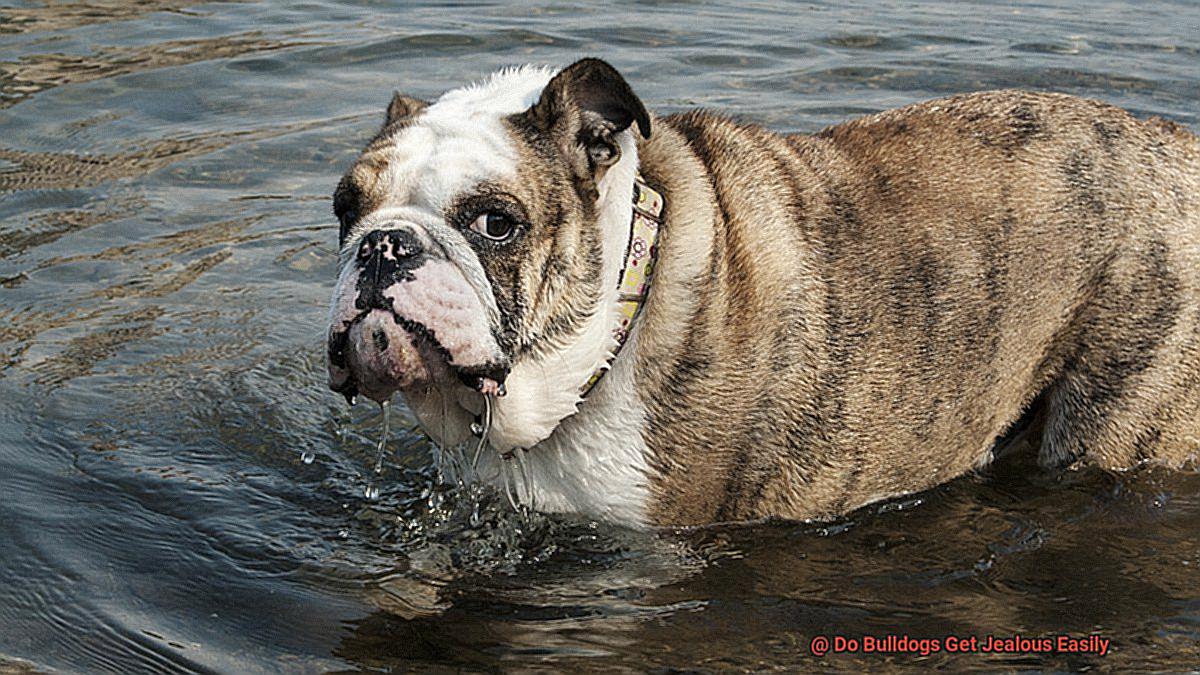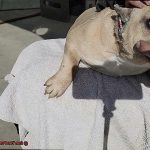Do Bulldogs Get Jealous Easily?
Welcome to the wild and wonderful world of Bulldogs. These squishy-faced bundles of joy have stolen countless hearts with their irresistible charm. But here’s the burning question on every dog lover’s mind: do Bulldogs really get jealous easily? Prepare to dive headfirst into the emotional rollercoaster that is Bulldog jealousy.
Jealousy, my friend, is a complicated beast. And when it comes to Bulldogs, it’s no different. In this blog post, we’re going to unravel the secrets behind their emotions and find out if these lovable pooches can indeed feel that green-eyed monster creeping up on them.
But before we embark on this thrilling journey, let’s take a moment to appreciate what makes Bulldogs so special. Their temperament? Check. Their social skills? Double check. And their unwavering loyalty? Oh, you better believe it.
So, whether you’re a proud Bulldog parent seeking answers or someone considering joining the wrinkly-faced club, buckle up because we’re about to uncover all the juicy details about jealousy in Bulldogs. Get ready for some eye-opening insights into their one-of-a-kind emotional world.
Do Bulldogs get jealous easily
Contents
- 1 Do Bulldogs get jealous easily
- 2 Understanding Bulldog Temperaments and Personalities
- 3 Signs of Bulldog Jealousy
- 4 Bulldog Possessiveness vs. Jealousy
- 5 Establishing Clear Boundaries for Your Bulldog
- 6 Proper Training and Socialization for Your Bulldog
- 7 Redirecting Unwanted Behaviors in Bulldogs
- 8 Positive Reinforcement for Desirable Behaviors in Bulldogs
- 9 Consulting a Professional Dog Trainer or Behaviorist
- 10 Conclusion
We all know that our furry friends are the most adorable and affectionate companions. But, did you know that Bulldogs can sometimes display behaviors that might seem like jealousy? In this blog post, we’ll dive deep into the world of Bulldog emotions and explore whether they get jealous easily. We’ll also provide practical advice on how to manage this emotion in your beloved pet. So, let’s wag our tails and get started.
Understanding Bulldog Jealousy:
Bulldogs are known for their loyalty and attachment to their owners. This strong bond can sometimes make them more prone to feeling jealous if they sense their connection is being threatened. Changes in routine or the introduction of new family members can trigger feelings of jealousy in Bulldogs. They might become possessive over their owners, toys, or food, or even display aggression towards perceived threats.
Managing Bulldog Jealousy:
As responsible Bulldog parents, it’s essential to recognize and address signs of jealousy promptly. Here are some tips to help you manage this emotion in your Frenchie:
- Shower them with love and attention: Bulldogs thrive on human companionship. Ensure you spend quality time with your furry friend to make them feel secure and valued.
- Set clear boundaries: Establishing rules and boundaries from an early age helps Bulldogs understand their place in the family hierarchy. This can prevent possessive behaviors from escalating.
- Fair and equal treatment: Treat all your pets equally to avoid triggering jealousy among them. Distribute attention, toys, and treats fairly so that no one feels left out.
- Training and socialization: Proper training and socialization are key to managing jealous behavior in Bulldogs. Teach them appropriate ways to express their emotions and reward positive behavior.
- Seek professional guidance: If you’re struggling to manage your Bulldog’s jealousy, don’t hesitate to consult a veterinarian or dog behaviorist. They can provide personalized advice and strategies tailored to your dog’s needs.
Understanding Bulldog Temperaments and Personalities
When it comes to bulldogs, their affectionate and loyal nature is well-known. However, these charming canines also possess unique temperaments and personalities that can influence their behavior, including feelings of jealousy. In this section, we’ll take a closer look at bulldog temperaments and how they can impact their propensity for jealousy.
- Friendly and Sociable Souls: Bulldogs are generally friendly and sociable dogs who thrive on human companionship. They love being part of their family’s activities and crave attention. Their affable nature often makes them a hit at social gatherings, as they effortlessly bond with both adults and children.
- A Dash of Stubbornness: Despite their friendly demeanor, bulldogs can be stubborn at times. This stubborn streak may contribute to feelings of possessiveness or jealousy when they feel their beloved human’s attention is being diverted elsewhere.
- Not all Bulldogs are Jealous: It’s crucial to note that not every bulldog exhibits signs of jealousy. Each dog is unique, and their sensitivity levels and emotional responses vary. Factors such as socialization, training, and upbringing can also shape a bulldog’s temperament and how they handle situations that trigger jealousy.
- Guarding Their Bond: Bulldogs form strong bonds with their owners, which can make them sensitive to any perceived threats to this relationship. Anything that jeopardizes their connection may trigger jealous behavior.
- Manifestations of Jealousy: Jealousy in bulldogs can manifest in various ways. Attention-seeking behaviors, possessiveness over possessions or territory, or becoming overly protective of their owners are common signs. It’s essential for owners to be mindful of these behaviors and address them promptly.
- Environmental Triggers: Changes in a bulldog’s environment or routine, such as the introduction of a new pet or family member, can also contribute to feelings of jealousy. These changes disrupt their established hierarchy and can evoke a jealous response.

To manage and prevent jealousy in bulldogs, it’s crucial to establish a foundation of trust, consistent training, and early socialization. Understanding your bulldog’s individual temperament is key in addressing any potential jealousy issues. Providing reassurance, positive reinforcement, and maintaining a stable routine can help minimize the likelihood of jealousy-related behaviors.
If your bulldog does display signs of jealousy, it’s essential to address the issue promptly. Seeking professional guidance from a veterinarian or animal behaviorist can provide valuable insights and strategies tailored to your bulldog’s specific needs.
In conclusion, while bulldogs may be prone to jealousy due to their affectionate nature and strong bond with their owners, understanding their unique personalities and implementing proper training, socialization, and management techniques can help prevent or address these behaviors. Remember, every bulldog is an individual with distinct temperaments, so tailor your approach accordingly.
Signs of Bulldog Jealousy
French Bulldogs are undeniably adorable and lovable companions. Their loyalty and affection towards their owners are unmatched. However, just like humans, these furry friends can also experience jealousy. Yes, you heard it right. Bulldogs can get a case of the green-eyed monster when they feel their beloved human’s attention is being diverted elsewhere. But how can you tell if your Frenchie is feeling jealous? Let’s dive into some tell-tale signs that may indicate your pup is experiencing a bout of envy.
Possessiveness Over Their Owner
Bulldogs are known for their protective nature, and when they’re feeling jealous, they can become possessive over their owners. They might growl, bark, or even nip at people who try to get too close. It’s their way of saying, “Back off. This human is mine.”
Attention-Seeking Behavior
Jealous bulldogs often resort to attention-seeking antics to reclaim the spotlight. They may become more vocal, demanding, or even destructive when they feel neglected. Picture your Frenchie jumping on furniture, pawing at you incessantly, or engaging in mischievous behavior like stealing objects or knocking things over. These are clear cries for attention.
Aggression Towards Other Pets
Jealousy can also manifest as aggression towards other pets in the household. Bulldogs might become territorial and possessive over their owners, leading to aggressive behavior towards any furry intruders who dare approach them. Growling, snapping, or even full-on fights can occur if your Frenchie feels threatened.
Changes in Behavior and Mood
Keep an eye out for any changes in your bulldog’s behavior and mood. A normally well-behaved and friendly pup might start acting out or displaying aggressive behavior when feeling jealous. They may become anxious, restless, or even depressed if they sense their owner’s attention is being directed elsewhere.
Perceptive Pooches
Bulldogs are highly perceptive animals who can pick up on subtle cues and changes in their environment. They can sense when their owner is paying more attention to someone else or when the household dynamics shift. These triggers can contribute to feelings of jealousy and insecurity in bulldogs.
Addressing Bulldog Jealousy
It’s crucial not to dismiss or ignore signs of jealousy in your bulldog. Ignoring these behaviors can worsen the jealousy and potentially lead to more serious issues such as aggression or anxiety. Here are some tips to help manage and prevent jealousy:
Provide Adequate Attention and Affection
Make sure to give your Frenchie plenty of love, attention, and reassurance. Set aside quality time for bonding activities like walks, playtime, and snuggles. Remind them that they are still your number one.
Bulldog Possessiveness vs. Jealousy
French Bulldogs are known for their charming personalities and loyalty. However, they can sometimes display possessiveness and jealousy, which can impact their behavior and relationships with their owners and other pets. In this post, we will explore the differences between possessiveness and jealousy in bulldogs, providing insights and tips to help you navigate these behaviors with your furry friend.
Possessiveness in Bulldogs:
Possessiveness in bulldogs is a common trait that stems from their territorial nature. Here are some key points to understand:
- Territorial behaviors: Bulldogs may growl, snap, or display resource guarding tendencies when it comes to food, toys, or even people.
- Guarding belongings: Bulldogs may become possessive over their toys, bed, or favorite spots in the house, showing signs of aggression if someone tries to take them away.
- Training and socialization: Proper training and socialization from an early age can help curb possessiveness tendencies and teach your bulldog appropriate behavior.
Jealousy in Bulldogs:
Jealousy in bulldogs refers to their emotional response when they feel threatened or insecure due to the attention or affection given to someone or something else. Here’s what you need to know:
- Attention-seeking behaviors: Bulldogs may exhibit attention-seeking behaviors like whining, barking, or trying to intervene when their owner interacts with others.
- Insecurity and perceived loss: Jealousy arises when bulldogs perceive a potential loss of their owner’s attention or affection towards another person or pet.
Managing Possessiveness and Jealousy:
To ensure a harmonious relationship with your bulldog, consider these tips:
- Positive reinforcement: Use positive reinforcement techniques to reward good behavior and discourage possessiveness or jealous reactions.
- Individual attention: Provide each bulldog with individual attention and reassurance to alleviate feelings of jealousy and promote a sense of security.
- Professional guidance: If possessiveness or jealousy behaviors become problematic or escalate, seek help from a professional dog behaviorist or trainer.
Establishing Clear Boundaries for Your Bulldog
Like any other breed, they can sometimes display signs of jealousy. In this blog post, we will explore how setting clear boundaries, providing structure, and creating a safe environment can help reduce feelings of jealousy in Bulldogs.
Setting Clear Expectations:
From the moment you bring your Bulldog home, it is important to establish clear boundaries and rules. This helps them understand what is expected of them and minimizes feelings of insecurity or jealousy. Crate training is an effective way to provide a designated space for your Bulldog, teaching them that certain areas or items are off-limits.
Implementing Structure:
Bulldogs thrive on routine. By creating a structured daily schedule for feeding, exercise, playtime, and attention, you are providing your Bulldog with a sense of security and predictability. This helps minimize jealousy by ensuring that they receive consistent care and attention.
Mental and Physical Stimulation:
Boredom can contribute to feelings of jealousy in Bulldogs. Keep your Bulldog mentally and physically stimulated by engaging them in activities that challenge their minds and provide physical exercise. Puzzle toys, obedience training, and interactive play sessions are excellent ways to keep their minds occupied and prevent negative behaviors.
Introducing New Additions:
When introducing new people or animals into your Bulldog’s environment, it is crucial to do so gradually and under controlled circumstances. This allows your Bulldog to adjust and become comfortable without feeling threatened or jealous. Supervised interactions and positive reinforcement can help build positive associations.
Consistency is Key:
Consistency is vital when establishing boundaries for Bulldogs. Ensure that all family members are on the same page regarding rules and expectations. Avoid giving mixed signals or inconsistent discipline, as this can confuse your Bulldog and contribute to feelings of insecurity or jealousy.
Conclusion:
By setting clear boundaries, providing structure, and creating a safe and stimulating environment, you can help reduce feelings of jealousy in your Bulldog. Remember that not all Bulldogs will display this behavior, but it is important to be proactive in preventing or addressing jealousy issues. With patience, training, and a loving approach, you can create a harmonious relationship with your Bulldog built on trust and understanding.
Proper Training and Socialization for Your Bulldog
Proper training and socialization are crucial for Bulldogs to ensure they grow up to be well-behaved and balanced individuals. In this article, we will focus on French Bulldogs and explore why training and socialization are so important for them. Drawing from my expertise as a Bulldog owner and trainer, I will provide insights and tips to help you raise a happy, well-adjusted French Bulldog.
Start Early and Lay a Strong Foundation:
Training should begin from a young age, ideally as soon as you bring your French Bulldog puppy home. This early start will establish a solid foundation for their behavior and make it easier to address any potential jealousy issues that may arise later on.
Basic Obedience Training:
Begin with basic obedience training, teaching your French Bulldog commands like sit, stay, and come. French Bulldogs respond well to positive reinforcement methods, so be sure to use rewards and praise to motivate them. Consistency in training is key to help them understand what is expected of them.
Socialization with People:
French Bulldogs are known for their affectionate nature, but it is essential to expose them to various types of people to prevent possessiveness or jealousy. Introduce your French Bulldog to children, adults, and strangers, encouraging gentle interactions and teaching them appropriate behavior around others.
Socialization with Animals:
To ensure your French Bulldog gets along well with other animals, introduce them to different animals such as cats or other dogs. Supervised playdates or visits to dog parks can be beneficial for their social development. Remember to monitor their interactions closely and intervene if necessary.
Exposure to Different Environments:
Taking your French Bulldog on regular walks in different environments will help them become familiar with various sights, sounds, and smells. This exposure will reduce the likelihood of fear or anxiety-related behaviors that can contribute to jealousy. A confident French Bulldog is less likely to exhibit possessiveness.
Consistency and Patience:
French Bulldogs can be stubborn at times, so patience and persistence are crucial during their training process. Establish clear rules and boundaries, and enforce them consistently. Seek professional help or join obedience classes specifically designed for Bulldogs if needed.
Mental Stimulation:
Provide your French Bulldog with plenty of mental stimulation through puzzle toys, interactive games, and training sessions. A mentally stimulated Bulldog is less likely to become bored or frustrated, reducing the chances of jealousy or other unwanted behaviors.
Redirecting Unwanted Behaviors in Bulldogs
French Bulldogs are known for their playful and affectionate nature, but like any breed, they can exhibit unwanted behaviors such as jealousy. Jealousy in dogs is often displayed through possessiveness, resource guarding, and attention-seeking behaviors.
However, with the right training strategies and consistency, you can effectively redirect these unwanted behaviors and create a harmonious environment for both you and your Bulldog. In this article, we will explore the best techniques to achieve this.
Provide alternative outlets for energy and attention:
Bulldogs have a playful nature, so engaging them in interactive play sessions or providing them with puzzle toys can redirect their focus away from jealousy-inducing situations. This will not only keep them physically and mentally stimulated but also help alleviate feelings of jealousy.
Establish clear boundaries and rules:
Bulldogs thrive on routine and structure, so setting consistent expectations and enforcing them consistently can help reduce jealousy-related behaviors. Make sure all family members are on the same page and follow the same training methods and rules to avoid confusion for your Bulldog.
Address the root cause of jealousy:
Bulldogs are loyal and prone to separation anxiety. Ensuring they feel secure and loved can help alleviate feelings of jealousy. Spend quality time with them, provide mental stimulation, and gradually desensitize them to triggers that may cause jealousy.
Use positive reinforcement training techniques:
Positive reinforcement can be highly effective in redirecting unwanted behaviors. Reward desired behaviors with treats, praise, or playtime to reinforce positive behavior and discourage jealousy-related behaviors. Consistency is key during the training process.
Seek professional guidance if needed:
If you’re struggling to redirect your Bulldog’s unwanted behaviors, don’t hesitate to seek the guidance of a professional dog trainer or behaviorist. They can provide personalized advice and techniques tailored specifically to your Bulldog’s needs.
Remember, patience is essential during the process of redirecting unwanted behaviors. It may take time for Bulldogs to adjust and understand what is expected of them. Remain patient, consistent, and persistent, and you will see positive results in the long run.
Positive Reinforcement for Desirable Behaviors in Bulldogs
To promote desirable behaviors in Bulldogs, positive reinforcement is the key. In this blog post, we’ll explore how positive reinforcement can be used to encourage good behavior in your Bulldog, ensuring a happy and well-trained furry friend.
The Importance of Positive Reinforcement:
Positive reinforcement involves rewarding your Bulldog for exhibiting desired behaviors. This technique is effective because it strengthens the bond between you and your dog while promoting the behaviors you want to see more of. By using rewards such as treats, praise, or playtime, you create a positive association with good behavior.
Highly Motivating Rewards:
To ensure the success of positive reinforcement, it’s crucial to use rewards that are highly motivating for your Bulldog. Bulldogs are known for their love of food, so treats can be an excellent choice. Choose high-quality treats that your Bulldog finds irresistible. Remember to adjust portion sizes to maintain a healthy weight.
Consistency is Key:
Bulldogs thrive on routine and clear expectations. Consistency is vital when using positive reinforcement. Establish consistent rules and boundaries and consistently reward your Bulldog for exhibiting desirable behaviors. This will help them understand what is expected of them and reinforce their good behavior.
Avoiding Unwanted Behavior Reinforcement:
Sometimes Bulldogs may exhibit behaviors that are considered unwanted, such as possessiveness or aggression. It’s essential to avoid inadvertently reinforcing these behaviors.
For example, if your Bulldog growls at another dog over a toy, don’t reward this behavior by giving them more attention or allowing them to keep the toy. Instead, redirect their attention to a more appropriate behavior and reward them for that.
Timing is Everything:
To effectively reinforce good behavior, timing is crucial. Rewards should be given immediately after your Bulldog exhibits the desired behavior. This helps them make the connection between their actions and the reward. Delayed rewards may confuse your Bulldog and make it harder for them to understand what they are being rewarded for.
Socialization and Training:
Positive reinforcement should be complemented with proper socialization and training. Expose your Bulldog to different people, animals, and environments from a young age. Teach them basic commands and manners to prevent unwanted behaviors and promote positive interactions with others.
Consulting a Professional Dog Trainer or Behaviorist
Jealousy can be a challenging behavior to tackle in French Bulldogs. Fortunately, consulting a professional dog trainer or behaviorist can provide invaluable assistance in understanding and addressing this issue effectively.
With their expertise and tailored guidance, these professionals can help you create a harmonious environment for your Bulldog and promote their overall well-being.
Expert Assessment and Tailored Advice:
A professional dog trainer or behaviorist possesses the knowledge and experience necessary to assess your specific situation accurately. They will identify the underlying causes of jealousy in your Bulldog and develop a personalized training plan to address these issues. By tailoring their approach to your Bulldog’s unique needs, they can effectively modify behavior and teach your pet appropriate ways to cope with jealousy.
Positive Reinforcement Techniques:
Professional trainers and behaviorists rely on positive reinforcement techniques to modify behavior. By rewarding desired behaviors and ignoring or redirecting negative ones, they can help your Bulldog learn alternative responses to jealousy triggers. This positive approach not only encourages good behavior but also strengthens the bond between you and your furry companion.
Specialized Expertise:
When choosing a trainer or behaviorist, opt for someone experienced in working with Bulldogs or similar breeds. Their specialized knowledge enables them to understand the unique characteristics and tendencies of French Bulldogs, enhancing the effectiveness of their training methods.
Multi-Dog Households and New Additions:
If jealousy issues are present in multi-dog households or arise when introducing a new pet or baby into the family, professional trainers and behaviorists are invaluable resources. They can provide guidance on managing jealousy between dogs, establishing clear boundaries, and implementing structured routines. Moreover, they offer strategies for introducing new members to ensure a smooth transition for all involved.
Understanding Body Language:
An additional benefit of consulting professionals is gaining insights into reading your Bulldog’s body language. Understanding their needs and emotions better will help you prevent or address jealousy-related behaviors promptly. This knowledge allows you to provide appropriate mental and physical stimulation, reducing feelings of jealousy and promoting a healthy and balanced lifestyle for your Bulldog.
Conclusion:
Consulting a professional dog trainer or behaviorist is essential when addressing jealousy issues in French Bulldogs. Their expertise, tailored advice, positive reinforcement techniques, specialized knowledge, and guidance on multi-dog households or new additions provide invaluable support. By seeking professional assistance, you can create a harmonious and fulfilling relationship with your beloved Bulldog while effectively managing their jealousy-related behaviors.
0m22Dt_uQuQ” >
Conclusion
Bulldogs are known for their loyal and affectionate nature, but do they easily succumb to jealousy?
The answer is a resounding yes. These adorable canines have a knack for feeling envious when they sense that someone or something is stealing their thunder.
From attention-seeking behaviors to sulking in the corner, Bulldogs will go to great lengths to make their owners aware of their discontent. Their expressive faces and soulful eyes only add to the drama, as they effortlessly convey their emotions without uttering a single word.
It’s no wonder why Bulldogs have earned a reputation for being masters of the guilt trip.




